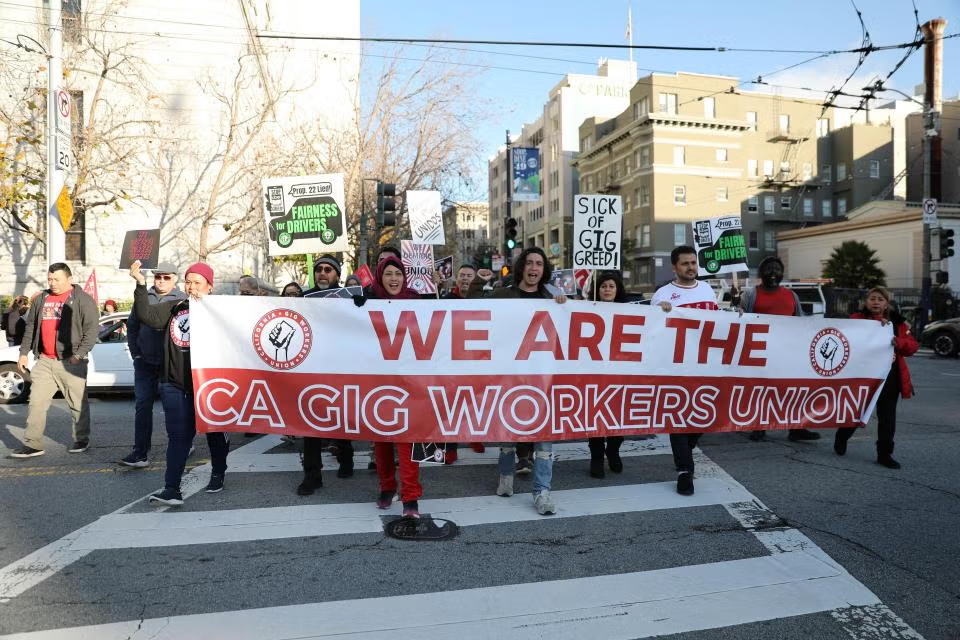California drivers for Uber, Lyft, and other ride-hailing platforms won a major victory for worker power this month after Governor Gavin Newsom signed a landmark bill creating a new framework for collective bargaining in the gig economy. The law, signed on October 3, allows unions representing app-based drivers to negotiate wages and benefits on an industrywide basis while keeping drivers classified as independent contractors. It is the first law of its kind in the nation and could become a model for other states as debates over gig-worker rights continue to reshape the future of work.
The new law, known as Assembly Bill 1340, covers roughly 800,000 ride-hailing drivers in California and introduces a form of “sectoral bargaining” that lets workers across multiple companies negotiate together instead of being pitted against one another. If 10 percent of drivers sign authorization cards, a union may seek certification and hold an election, or if a majority sign cards, the union may be certified directly. Once recognized, a union will have the right to bargain on behalf of all drivers in the state, setting industrywide standards for pay, benefits, and safety conditions, an arrangement that could finally bring stability and dignity to a workforce long denied both.
Supporters hailed the measure as a breakthrough for gig workers who have been excluded from the basic protections that most employees take for granted. Governor Newsom called the bill proof that California can lead where Washington has failed, declaring that the state was “giving drivers the power to unionize while we continue our work to lower costs for families.” Uber and Lyft, once fierce opponents of unionization, did not fight this bill after lawmakers paired it with a measure reducing costly insurance requirements—an acknowledgment that organized labor had shifted the political landscape in its favor.
Labor leaders called the law a turning point in a decade-long battle to restore rights stripped away by Proposition 22, the 2020 ballot measure that enshrined contractor status for gig workers and dealt a blow to California’s labor movement. Tia Orr, executive director of SEIU California, which helped sponsor the bill, said that sectoral bargaining will lift standards for all drivers and prevent corporations from racing to the bottom on wages. Lorena Gonzalez, head of the California Labor Federation and author of the 2019 bill that first extended employee protections to contractors, said the new law is an important step forward under Prop 22’s constraints but urged other states to go further and refuse to accept the the contractor model.
For drivers, the law represents a hard-fought recognition that flexibility should not come at the cost of rights or fair pay. Although drivers remain classified as contractors and therefore lack access to overtime pay, unemployment insurance, and workers’ compensation, the ability to organize collectively gives them a powerful new tool to demand change. Labor advocates see it as the first real opportunity for gig workers to negotiate from strength rather than rely on the goodwill of multibillion-dollar corporations.
The fight over gig-worker classification has defined California’s labor politics for nearly a decade. In 2018, the state Supreme Court ruled that most workers must be classified as employees under the so-called ABC test, which was later codified into law through Assembly Bill 5. Gig companies poured more than $200 million into passing Proposition 22, which overturned those rules and cemented their business model. That measure provided limited benefits such as a health-care stipend and a minimum rate per ride, but researchers and drivers’ groups say actual wages have dropped because waiting time and expenses are excluded.
The new law, set to take effect January 1, 2026, will allow drivers to begin organizing under the supervision of the Public Employment Relations Board. Whether it leads to higher pay and stronger protections will depend on how effectively workers can organize across platforms and how aggressively unions push to close the remaining gaps left by Prop 22. But for many in California’s labor movement, the symbolism of the win is already profound. After years of setbacks, gig workers are reclaiming a measure of collective power in the state that first defined their exploitation. If it succeeds, this experiment in sectoral bargaining could become the blueprint for rebuilding worker rights across the gig economy nationwide.

